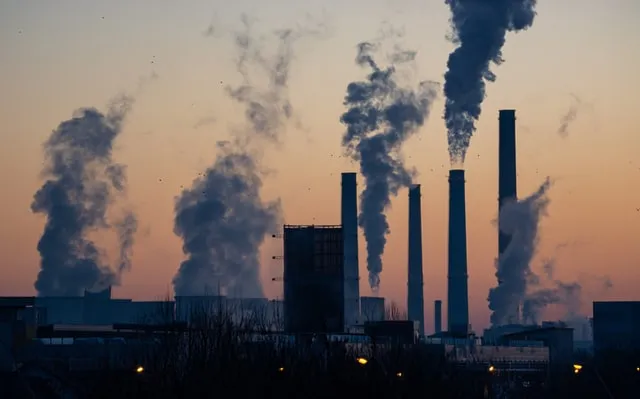What is the future for fossil fuel investments?
With the IPCC's latest report warning that time is running out to avoid climate catastrophe, the world's reliance on fossil fuels is increasingly untenable. Investors are starting to look for green alternatives.
Fossil fuels have built the world as we know it today, powering our global economy and generating most of the world's electricity. But over the last 170 years, humans have burned through so much oil, gas and coal that the earth's average temperature is now warmer than at any point in the past 125,000 years.
And we're already suffering the consequences, according to the latest assessment from the Intergovernmental Panel on Climate Change (IPCC). The long-awaited report starkly presented "undisputed" evidence that carbon pollution and greenhouse gases from human activity are causing profound changes to our world: more extreme heatwaves and fires, increased rainfall and floods, longer droughts and the shrinking Arctic.
Energy systems need to adapt
The IPCC report didn't directly mention fossil fuels, but that hasn't stopped other leading organizations from calling them out. Earlier this year, G7 leaders agreed to start phasing out fossil fuel financing overseas and end support for unabated coal power. And in May, the International Energy Agency (IEA) published a landmark report that called for a complete stop on new investments in oil, gas and coal supply after this year — despite the growing number of countries making net-zero emissions pledges for the coming decades.
"This gap between rhetoric and action needs to close if we are to have a fighting chance of reaching net zero by 2050," said Fatih Birol, IEA executive director. "Doing so requires nothing short of a total transformation of the energy systems that underpin our economies."

Part of that transformation will come from investors seeking to protect the future value of their assets. Sarah Brown, an electricity transition analyst at UK-based energy think tank Ember, told DW that investors and insurers are increasingly facing risk — from extreme weather events, the energy transition or changing regulations.
"The recent findings of the IEA and IPCC reports should not have come as a surprise, and there are multiple existing national policies and global commitments that mean investment in new fossil fuel assets does not make economic sense and has not for quite some time," she said.
Brown highlighted several planned coal power plant projects across Europe which have been cancelled just in the last few months, including in Serbia, Bosnia-Herzegovina and Turkey. "Utilities, financial institutions, engineering companies and governments are all seeing there is no future for coal-fired electricity generation," she said.
'Fossil fuels aren't going to disappear overnight'
But Samantha Gross, director of the Energy Security and Climate Initiative at the US research group Brookings Institution, doesn't think investors will be so quick to drop fossil fuels. She pointed out that despite advances in renewable energy, the world still hasn't found a reliable substitute for oil and natural gas, which she has called the "lifeblood of the modern economy."
"We're definitely seeing pressure from a lot of different camps to move away from fossil fuel investments," she told DW. "And I don't disagree with the sentiment. The challenge will be that fossil fuels aren't going to disappear overnight."
Gross said oil and gas have more energy per weight than other fuel sources, making them crucial for industrial processes that need very high heat, or for sectors like aviation, shipping and long-haul trucking, where electric vehicles aren't yet up to the task. Not to mention the fact that more than three-quarters of the world's electricity is still produced by fossil fuels, according to the latest analysis by oil giant BP.

"You're not going to see a sudden halt in all investments in fossil fuels. But I think what you'll see is that more expensive and more risky investments will start to go away first. And I think that process is certainly beginning," said Gross.
She believes the industry is nearing a "tipping point" on carbon-intensive processes like oil sands development or fracking, with some investors now shifting instead to inexpensive renewables with good rates of return.
"[This is] something that investors are doing because there's money to be made in it. That's how things really get done. Seems a little crass, but it's true," she said.
Climate changes at Exxon, Chevron
While the trend to make greener investments has been more visible in Europe, with retirement funds in countries like the UK, Sweden and Norway taking steps to limit climate-related exposure, there's been some movement in the US as well — and not just with pensions.
On May 26, 61 percent of Chevron shareholders backed a proposal asking the oil company to cut its total greenhouse gas emissions. That same day, small activist hedge fund Engine No. 1 took three seats on the board of Exxon Mobil after a months-long campaign that stressed the oil giant's fossil fuel focus represented an "existential risk."

In May, a Dutch court ordered Shell to reduce its carbon emissions by 45% by 2030 from 2019 levels
Speaking with investors in July, CEO Darren Woods said Exxon Mobil was aiming to play "a key role in the energy transition while continuing to grow shareholder value," highlighting developing markets for carbon capture and storage, hydrogen and biofuels. However, Woods — who had campaigned against Engine No. 1 — warned they shouldn't expect "huge shifts in strategy."
Nevertheless, said Gross, "It's quite stunning what they were able to do," underlining the significance that it was the investors who had pushed for change, rather than external pressure. "Nothing against NGOs, but when the investors start talking, they listen."
Fight to stay relevant
But some companies are still fighting to delay the inevitable fossil fuel phaseout and profit losses. German utilities RWE and Uniper, for example, announced in April their intention to sue the Dutch government over its plan to end coal-fired power generation by 2030, citing billions in damages.
Fossil fuel messaging is also playing its part. InfluenceMap, a think tank that studies how corporate lobbying impacts climate policy, revealed in 2019 that the five largest publicly traded oil and gas companies — Exxon Mobil, Royal Dutch Shell, Chevron, BP and Total — have spent more than $1 billion (€853 million) to campaign against climate policies or buy misleading ads since the 2015 Paris Agreement. The aim is to promote oil and gas as part of the solution to the climate crisis, along with new technologies, to keep them in the energy mix as long as possible.
"Many big energy companies look to be very focused on transition pathways that only modestly adapt their current business models, relying heavily on carbon capture and storage [CCS] to mitigate their emissions or produce blue hydrogen from natural gas," said Brown, adding that these approaches also have significant climate and financial risks.
While acknowledging the potential for greenwashing, Gross said companies using these transitional technologies could potentially have skills that would help further develop renewable energy like geothermal power or offshore wind farms.
"Certainly, some companies understand that this is the way the future is going. They want to continue to be relevant in the energy industry, and so they're focusing on how they can be relevant in an industry that has a different shape than the one we have now," said Gross. "They understand which way the wind is blowing and are trying to move accordingly."
(This article by author Martin Kuebler was originally published on Deutsche Welle.)
Edited by Suman Singh
(Disclaimer: The views and opinions expressed in this article are those of the author and do not necessarily reflect the views of YourStory.)








